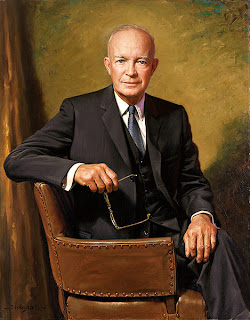IKE PRESENTS OPEN SKIES PROPOSALS AT GENEVA SUMMIT
Geneva, Switzerland (JFK+50) Sixty years ago today, July 21, 1955, President Dwight D. Eisenhower presented his "Open Skies" proposals at the Geneva Summit.
The proposals called for both the United States and Soviet Union to exchange maps detailing the exact location of all military installations.
They also provided that once the maps were "in hand" both nations could conduct aerial flights over the installations of each others country to make sure they were in compliance with arms control agreements.
According to the National Museum of the United States Air Force, President Eisenhower "reasoned that getting permission to fly over Soviet military facilities while granting permission for the Soviets to overfly U.S. military installations would greatly ease tensions between the superpowers."
The Soviets rejected Ike's proposals which resulted in the continuation of U.S. reconnaissance flights over the U.S.S.R. In August 1960, however, the first CORONA reconnaissance satellite ended the need for U.S. overflights of the Soviet Union for a period of 30 years.
In 1989, the Open Skies proposal was revived "to allow countries without satellites to get reliable information about military development in other countries."
SOURCE
"Open Skies Proposals," National Museum of the United States Air Force, January 6, 2006, www.nationalmuseum.af.mil/
Dwight D. Eisenhower
LIBERTY BELL 7 SINKS DURING RECOVERY
Washington, D.C. (JFK+50) Fifty-four years ago today, July 21, 1961, Liberty Bell 7, a spacecraft piloted by astronaut Gus Grissom, splashed down in the Atlantic Ocean only to sink during the recovery process.
President John F. Kennedy watched live television coverage at the White House.
While the flight itself was deemed a success, NASA officials were more than concerned about the sinking of Grissom's space capsule.
In the afternoon, JFK signed into law HR 6874 authorizing the establishment of the National Aeronautics and Space Administration.
Astronaut Gus Grissom
Geneva, Switzerland (JFK+50) Sixty years ago today, July 21, 1955, President Dwight D. Eisenhower presented his "Open Skies" proposals at the Geneva Summit.
The proposals called for both the United States and Soviet Union to exchange maps detailing the exact location of all military installations.
They also provided that once the maps were "in hand" both nations could conduct aerial flights over the installations of each others country to make sure they were in compliance with arms control agreements.
According to the National Museum of the United States Air Force, President Eisenhower "reasoned that getting permission to fly over Soviet military facilities while granting permission for the Soviets to overfly U.S. military installations would greatly ease tensions between the superpowers."
The Soviets rejected Ike's proposals which resulted in the continuation of U.S. reconnaissance flights over the U.S.S.R. In August 1960, however, the first CORONA reconnaissance satellite ended the need for U.S. overflights of the Soviet Union for a period of 30 years.
In 1989, the Open Skies proposal was revived "to allow countries without satellites to get reliable information about military development in other countries."
SOURCE
"Open Skies Proposals," National Museum of the United States Air Force, January 6, 2006, www.nationalmuseum.af.mil/
Dwight D. Eisenhower
Official White House Portrait
LIBERTY BELL 7 SINKS DURING RECOVERY
Washington, D.C. (JFK+50) Fifty-four years ago today, July 21, 1961, Liberty Bell 7, a spacecraft piloted by astronaut Gus Grissom, splashed down in the Atlantic Ocean only to sink during the recovery process.
President John F. Kennedy watched live television coverage at the White House.
While the flight itself was deemed a success, NASA officials were more than concerned about the sinking of Grissom's space capsule.
In the afternoon, JFK signed into law HR 6874 authorizing the establishment of the National Aeronautics and Space Administration.
Astronaut Gus Grissom
Liberty Bell 7
NASA Photo

